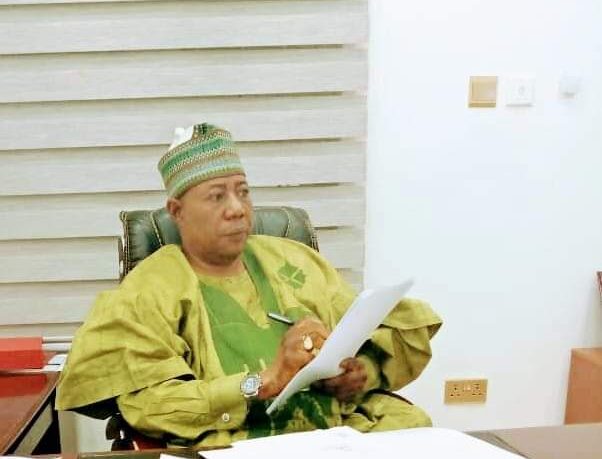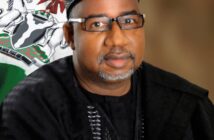Sustainable peace is the anchor on which the prosperity and integrity of any nation is hinged. A lot depends on peace because in the 21st century global economic dynamics, investments flow in the direction of a predictable and conducive environment.
Unfortunately, the much-needed peace has eluded Nigeria in the last decade, especially in the North. What began around 2010 like a phantasmagoria in the Northern East state of Borno, rapidly snowballed into a national concern. Since then, leaders have come and gone, with the security challenges remaining intractable.
It’s on record that security in the North was still a challenge until President Bola Ahmed Tinubu took office on May 29, 2023. With concerted efforts, deft leadership and purity of motives, he was able to quench the raging fire in the North East. He then shifted attention to the North West where the fight for grazing and farmland has resulted in a national emergency.
President Tinubu’s efforts to end banditry in Nigeria’s North West region have been swift and decisive. Since taking office, he has taken proactive measures to address the escalating security challenges. One of his key strategies has been the deployment of high-ranking officials to the region, including the Minister of State for Defence, Bello Matawalle, and the Chief of Defence Staff, Christopher Musa, as well as other Service Chief. This move has sent a strong message that the Renewed Hope administration is committed to restoring peace and stability in Nigeria.
Seeing the purity of President Tinubu’s commitment, key Northern stakeholders have commended his efforts. For instance, the North West Agenda for Peace (NOWAP) recently hailed the President for his proactive approach to addressing the security challenges in the region. Similarly, the Concerned Scholars for Peace and Development (CSPD) has also thrown its weight behind President Tinubu’s efforts to tackle banditry in the country. CSPD and NOWAP’s endorsement is significant, as it indicates that local stakeholders recognise the government’s efforts to tackle the complex issues driving banditry.
And what’s more, the announcement by Nigeria’s Chief of the Air Staff (CAS), Air Marshal Hassan Abubakar last Friday that the federal government procured 12 new aircraft to shore up the operational capability of NAF is a soothing relief. This is within a year of President Tinubu’s presidency. As announced by Abubakar, the newly acquired aircraft were deployed to service between September 2023 and September 2024. That’s not all; NAF is expecting to take delivery of more aircraft in the coming months, according to Abubakar.
The aircraft’s specifications are as follows: four Diamond 62 surveillance aircraft; two King Air 360 light transport aircraft, 4 x T-129 ATAK helicopters and 2 x Agusta Westland 109 Trekker.
“Moving forward, the NAF is poised to take delivery of 24 x M-346 fighter aircraft6 and 10 additional Agusta Westland 109 Trekker helicopters from Italy. Others are 3 x CASA 295 transport aircraft from Spain and 12 x AH-1Z Vipper helicopters from the United States,” the CAS disclosed.
These efforts are already paying off on all fronts. At the command of the Commander-in-Chief of the Nigerian Armed Forces, our security forces have taken the battle to the enemies of our collective peace. These renewed zest, according to the Minister of Defence, Muhammad Badaru, has resulted in synergy among the Service Chiefs and sister agencies, and the synergy has, in turn, led to the killing of over 9,300 bandits and insurgents, while 7,000 have since been arrested in the last one year.
And then came the onslaught in which the Nigerian Army killed a notorious bandit leader and arms supplier, Kachalla Halilu Sububu, in a major operation against bandits in the North West. Sububu, a key figure in the region’s banditry, operated a large mining site in Dan-Kamfani, Anka local government area (LGA), and owned thousands of cattle in the infamous Sububu Forest.
The end also came recently for Buhari Alhaji Halidu otherwise known as “Buharin Yadi”, who unleashed terror on citizens in Kidandan/Galadimawa general areas of Giwa LGA, Sabon Birni/Kerawa general areas of Igabi LGA, other locations in nearby Sabuwa LGA of Katsina State, and indeed some parts of Niger and Zamfara States.
Another bandits kingpin commonly called Dangote was killed in a gun battle within Kachalla Dankarami’s camp along the Dumbunrun Forest between Batsari and Jibia local government areas of Katsina State.
Also, Boderi Isyaku, notorious bandit leader responsible for the kidnapping of 39 students of the Federal College of Forestry Mechanisation and the attack on the Nigerian Defence Academy (NDA), Kaduna, in 2021, was eliminated by the military.
Kachalla Tukur Sharme alias Dan Chaki, a notorious bandit commander and members of his gang were killed in a rival fratricidal clash. Sharme and his gang of bandits were largely responsible for attacks, killings, and kidnappings in Millenium City, Maraban Rido, Kujama, Kajuru and Maro villages in the Kateri general area, and other locations in adjoining LGAs of Kagarko, Kachia and Birnin Gwari.
This was in addition to his criminal acts in neighboring states of Katsina and Niger which were also left reeling from the waves of his terrorism. The most heinous acts perpetrated by Kachalla Sharme was the kidnapping of 121 students of the Bethel Baptist High School, Kujama, Kaduna State on July 5, 2021.
Similarly, Dogo Gudali, a notorious bandit leader in Zamfara State, was killed by an Improvised Explosive Device (IED) planted by members of his terrorist group. Dogo Gudali and his gang members were terrorising Anka, Gummi, Bukkuyum, and some parts of Sokoto and Kebbi States.
Again, Dogo Rabe was killed in an Air Force strike during an operation to flush out terrorists operating in communities between the Zurmi and Birnin Magaji areas in Zamfara State, and Jibia in Katsina State.
Alhaji Auta and Kachalla Ruga were killed alongside many of their gang members in a raid on their enclaves at Gusami Forest and Tsamre village in Birnin Magaji LGA of Zamfara State, while Rufai Maikaji who was a deadly bandit who commanded over a hundred fighters in the state met his much expected end.
Another bandits leader, Ya’u, was killed in an ambush by the troops at a strategic crossing point in Burra, Ningi. He was the leader of the gang which is notorious for using heavy weaponry to instill terror among the residents of Burra and neighbouring communities.
Also, another notorious bandits leader, Alhaji Karki, was killed while attempting to overrun a military unit in Niger State. Karki, who once repented but later went back to criminality, had been terrorizing Niger communities and was responsible for killings, arsons and kidnappings in the areas.
Yet, another bandits leader, “Yellow”, who was operating several bandit camps in Zamfara, Kaduna, and Katsina states, was killed following Nigerian Airforce air strikes in Katsina and Zamfara States.
It therefore leaves a sour taste in the mouth for some conflict entrepreneurs to accuse Tinubu of lack of interest in tackling insecurity in the North. In advanced climes, politicians can play politics with anything but not national security. If any issue touches on national security, politicians bury their differences immediately and join hands to ensure the ship of state is salvaged. Any sane politician know that politicking can only be possible in the atmosphere of peace and tranquility.
On one hand, it’s true that Nigeria has faced an alarming surge in insecurity over the past decade. However, President Tinubu’s administration has taken steps to address this crisis. Moreover, some analysts have argued that the criticisms leveled against President Tinubu is unfounded, considering the complexity and entrenched nature of the problem. They point out that reversing years of neglect and insecurity requires time, strategic planning and coordination.
While challenges persist, it’s essential to acknowledge the efforts made by the Tinubu administration. A balanced evaluation of the situation is necessary, considering both the progress achieved and the work that is still to be done.
His predecessor, who was a retired military General couldn’t contain this surge. If you ask me, what Tinubu (a civillian) has achieved in securing the North within one year deserves commendation. He has out-perdormed his predecessors, if weighed in the balance. Though more efforts is still needed but we must not fail to give him kudos for the achievements so far.
I must say that the cumulative effects of the successes recorded in the fight against insecurity is the gradual increase in food production and circulation. As we speak, because of the favourable security climate in the affected areas, farmers are returning to farm in droves in the North West.
Before Tinubu took office, front pages of Nigerian newspaper were awash with numbers of people killed by bandits on daily basis. Today, evidence, they say, is the end of argument.
Nigerians must come out of the darkness cast on them by propaganders of hate rate. These political and economic abals using stolen public funds to create enemies for the President to score cheap political sympathy must be checked.
This is why during our national recent tour with prominent and senior citizens of our great nation it was unanimously agreed that that most of the politicians that failed Nigeria and looted the nation’s public funds are not having it easy in their shrill attempt to create division because no longer have no access to the national treasury as usual.
Finally the National Security Adviser (NSA) should hold meetings with all fomer national security chiefs, including retired Directors-General of the NIA and DSS, as well as retired service chiefs for more more proactive measures against insecurity.
Ultimately, addressing Nigeria’s insecurity requires a collective effort, transcending partisan divisions and fostering constructive dialogue. By recognising the complexities of the issue and the steps being taken, we can work towards a more secure and peaceful future for all Nigerians.




